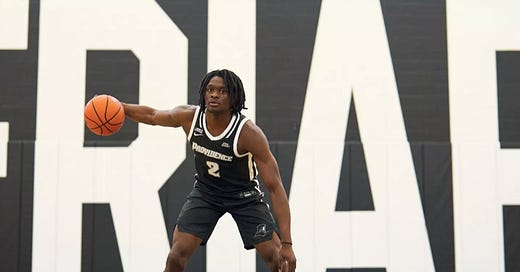Player Preview Series: Wesley Cardet's two-way potential
Rounding out our Player Preview Series is a look at Chicago State transfer Wesley Cardet Jr., who averaged over 18 points per game last season.
You don’t have to look hard to find evidence of whether or not Wesley Cardet Jr. can produce against high major talent — the question is how quickly he can adjust to doing so on a deeper, more talented team in Providence.
In many ways, the game should come easier for Cardet, a Florida native who averaged 18.7 points per game at Chicago State last season. Surrounded by more talented teammates, he won’t be the sole focal point of opposing scouting reports, and his team can survive an off night from him this year.
Conversely, Cardet had the ball his hands a lot for a Chicago State team that won more games in his two years there (24) than they had in the previous six (23).
Providence assistant coach Tim Fuller has a strong relationship with Cardet’s uncle, Gerald Gillion, who Cardet followed to Samford (where he was an assistant coach) and later to Chicago State when Gillion took over there, despite having offers from Auburn, Alabama, USC, Miami, Florida, and Illinois coming out of high school. Cardet decided to transfer last spring when Gillion left for an assistant role at Long Island.
The Friar staff moved immediately once Cardet hit the portal, viewing him as a physical defender who lived in the paint offensively (nearly 8 points in the paint per game last year). They also saw Cardet as a high character addition to their roster.
He was leaned on heavily throughout the past two seasons, and generally delivered. Over Chicago State’s last eight seasons as a member of the WAC (the Cougars went independent starting in 2022) they were 9-95 in conference play and didn’t win more than eight games in a season. In Cardet Jr.’s two seasons there they won 10 and 13 games, including an upset at #25 Northwestern last season.
While he had some off nights against high major opponents (4-22 shooting versus Wisconsin, 5 points against Oklahoma State), Cardet was generally productive against teams from power conferences. He scored 30 points against Stanford his sophomore year, as well as 18 against Marquette, 16 versus Gonzaga, and 18 in a two-point loss to Minnesota that season.
His junior year was a breakout: 18.7 points, 4.5 rebounds, 2.6 assists, 34% shooting from distance, and 143 made free throws. He scored 55 points in two postseason games, had 30 in the win at Northwestern, and 37 combined against DePaul (18) and Kansas State (19).
A righty, Cardet Jr. prefers going left on his drives: 48 of his 78 drives to the bucket were to his left, according to Synergy Sports. Cardet lived at the free throw line, making 299 free throws over the past two seasons. He also had a high number of “and 1s” with 17.
Cardet did a lot of damage getting downhill, with 184 possessions as a pick and roll scorer and 54 more in isolation.
Defensively, Synergy ranked him in the 83rd percentile overall in defense and in the 90th percentile when playing man-to-man, while he committed just 1.5 fouls per game.
“He’s been great, and what’s great is how much better he’s continued to get periodically throughout the summer, and now the fall,” Kim English told us on The Friar Podcast last week.
“He’s a tenacious defender who can really lock in on-ball. He’s just learning our system, whereas at Chicago State he was by far and away the best player on the team at going on one one, and he could just go by guys and create. Now there’s a bit more nuance in the decisions and reads he’s asked to make, so he’s learning what those reads look like and when to make them — and also when to keep his aggression.”
After playing in front an average of 228 fans per night at home last year for Chicago State, Cardet is two days away from a dramatically different environment in PC’s home debut.
“He’s a true 6’5 with long arms. He’s a strong, strong kid and he plays with physicality,” PC assistant Matt Palumbo said of Cardet in a conversation this summer. “We feel like he has potential to be elite defensively. He’s a really good on-ball defender.”
“Wesley adds a different element of being able to get downhill on his own, being able to draw to defenders, pass it, and make plays.”






Can’t wait for the season to start.
Thanks Kevin